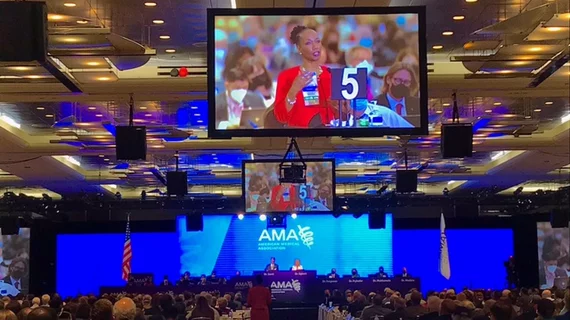New AMA president-elect chosen after annual meeting controversy
There was controversy at the American Medical Association (AMA) annual meeting involving alleged inappropriate back-room dealmaking to secure votes by AMA presidential candidate Willarda Edwards, MD. Edwards addressed the House of Delegates June 13.
The delegates meeting on June 13 was delayed about 15 minutes because allegations were brought to the attention of AMA leadership.
Speaker of the AMA House of Delegates Bruce Scott, MD, a member of the AMA Board of Trustees, said the allegations were brought to their attention and discussed prior to the opening of Monday’s session. He said there appeared to be evidence to support that Edwards engaged in a “quid pro quo” deal for support from one state delegation in exchange for support for another candidate in a future AMA election.
“Under our rules the speaker is supposed to make a report to the House of Delegates to determine the response,” Scott said.
Edwards was given a chance to respond and address the House of Delegates. She characterized the allegation of impropriety as a “misunderstanding” and hopes to clear up any issues.
“I respect the wisdom of the house," Edwards said. “I ask that you give me the opportunity to answer any questions about this misunderstanding. I believe in the integrity of our organizations.”
Despite the controversy, Jesse M. Ehrenfeld, MD, MPH, an anesthesiologist from Wisconsin, was voted president-elect of the AMA. He will serve as president-elect for a year before being sworn in as president in June 2023. Ehrenfeld was elected to the AMA Board of Trustees in 2014, serving as chair from 2019 to 2020. He also served also as a member of the governing councils of both the AMA Young Physicians Section and the AMA Resident and Fellow Section, as well as the governing boards of the American Society of Anesthesiologists Resident Component and the Illinois State Medical Society.
“I am honored to be elected by my peers to represent the nation’s physicians and the patients we serve,” Ehrenfeld said in a statement. “It is a pivotal and challenging time for medicine, physicians and our health system, and as president-elect, I am committed to advancing the AMA’s immediate goals around the Recovery Plan for America’s Physicians, as well as the longer-term advocacy efforts aimed at shaping the future of medicine and improving the health of the nation.”
Ehrenfeld is currently a practicing anesthesiologist, senior associate dean and tenured professor of anesthesiology at the Medical College of Wisconsin, where he leads the largest statewide health philanthropy, the Advancing a Healthier Wisconsin Endowment. Ehrenfeld is also an Emmy-nominated photographer and 2015 recipient of a White House News Photographers Association award for his work in capturing and advocating for the lives of LGBTQ+ people, according to the AMA.

